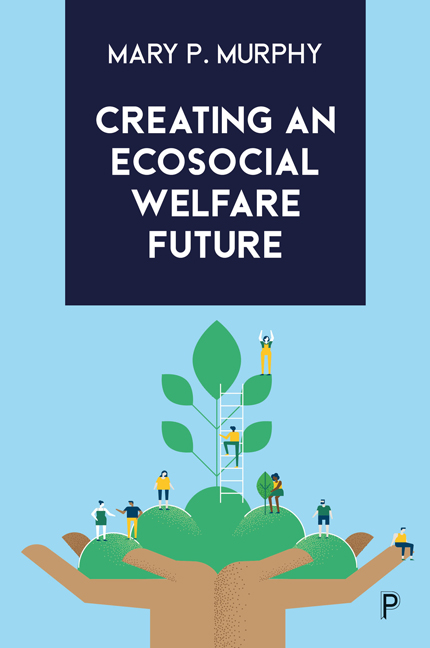Book contents
- Frontmatter
- Dedication
- Contents
- List of figures and tables
- Acknowledgements
- Introduction: The case for a welfare imagination
- PART I From problems to solutions: a post-growth ecosocial political economy
- PART II Building an ecosocial imaginary
- PART III An ecosocial political imaginary
- Conclusion: The case for systemic transformation
- Appendix: Ireland
- Notes
- References
- Index
2 - From unsustainable environmental outcomes to a post-growth world
Published online by Cambridge University Press: 20 January 2024
- Frontmatter
- Dedication
- Contents
- List of figures and tables
- Acknowledgements
- Introduction: The case for a welfare imagination
- PART I From problems to solutions: a post-growth ecosocial political economy
- PART II Building an ecosocial imaginary
- PART III An ecosocial political imaginary
- Conclusion: The case for systemic transformation
- Appendix: Ireland
- Notes
- References
- Index
Summary
Chapters 2 and 3 are different sides of the same coin. They demonstrate the impact of the highly financialised and commodified global regime on the environment and the damages associated with dysfunctional treatment of animals, mindless travel and excessive consumption. This chapter explores the impact of this regime on the planet, and the following chapter examines the impact on society; the interrelated problems in both chapters require cojoined solutions. The collective impacts on both the planet's eco system and society cannot be overstated. We are approaching planetary tipping points which may be irreversible; global warming is triggering devastating impacts such as major ice melts and disrupted wind and ocean currents. Mitigating these effects will require radical transformation. Recent reports of the Intergovernmental Panel on Climate Change (IPCC) conclude that unprecedented transformation and implementation is required within this decade, and that a system change is now required (IPCC, 2022a). The cost of climate transition is already being felt more by those who can least afford and who least contributed to the problem (Gough, 2017), hence the need for transitional justice and welfare state intervention at a global level. Neither technological adjustments nor price mechanisms will achieve such transformation, whereas a post-growth orientation offers a potential pathway to decommodification (Hickel, 2021; Jackson, 2021). The chapter concludes by reflecting on how Ireland's political economy impacts negatively on local and global ecological sustainability and biodiversity.
How bad is environmental degradation?
Climate change refers to a range of complex issues and is integrally related to the concern with conserving and protecting our biodiversity and avoiding ever increasing species loss. More specifically, social environmentalists understand contemporary climate change as rapid global warming caused by humans emitting greenhouse gases (GHGs) and carbon dioxide (CO2) into the atmosphere and oceans. Major concerns now encapsulated within climate change became dominant over the last 50 years, particularly since Rachel Carson's 1960's book and film, The Silent Spring (Carson, 1962). Following the publication in 1972 of the Limits to Growth report (Meadows et al, 1972), sustainability became a growing concern leading to the establishment of the Brundtland Commission by the United Nations and its 1987 landmark report (Brundtland, 1987).
- Type
- Chapter
- Information
- Creating an Ecosocial Welfare Future , pp. 29 - 42Publisher: Bristol University PressPrint publication year: 2023



